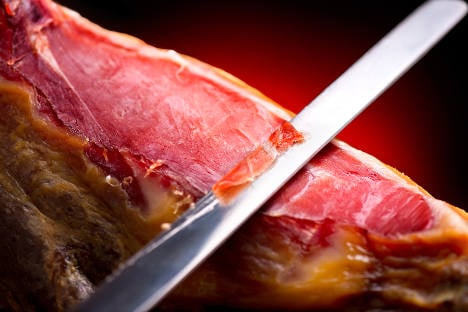While he samples the product, three of his colleagues learn to cut the ham as finely as possible – a crucial detail that they will put into practice back in Shanghai at tasting events for their own customers.
The world's top pork consumer, China has started getting a serious taste for Spain's world-famous “jamon” which is sold there as a luxury product and is getting one over on its French and Italian competitors.
“At the beginning, customers were just looking for elegant products because they're rich,” says Wu, a sales manager at Jiarui Fine Foods, a Chinese company that specialises in importing luxury gastronomy products.
“But more and more they want to learn more and educate themselves… to know why it's so good and why it's got such a high price.”
€3,000 a ham leg
The Italians got into the Chinese market early on with their Parma ham.
But Spain soon caught up and is now leading sales of dry-cured ham in the Asian powerhouse, making 1.8 million euros ($2 million) in sales last year excluding Hong Kong, according to the French Federation of Pork Industries (FICT).
By comparison, Italy made €1.4 million in 2016 and France tailed far behind with just €30,000, as there is only one producer in the country equipped with the necessary authorisation to sell ham in China compared to 13 in Spain.
So it was that in March, several Jiarui Fine Foods employees travelled to the village of Jabugo in the southern hills of Andalusia, invited by the Cinco Jotas brand that specialises in high-quality ham.
In pasturelands covered in oak trees, herds of purebred black Iberian pigs gobble the last acorns of winter — the very food product that gives the ham its unique hazelnut taste after a three-year maturing period.
There, Cinco Jotas workers give the Chinese sales managers a run-down of how the dry-cured ham is made.
They will use this knowledge to attract customers in China where classic dry-cured ham sells for 10 to 20 percent more than in Spain, and the highest quality ones command even fatter margins.
A leg of “pata negra” ham, the most sought-after, can go for up to €3,000 in Hong Kong.
Forced to diversify
Like 12 other Spanish ham makers, Cinco Jotas got authorisation to sell its ham in China at the beginning of the decade, and the world's most populous country has now become its number one market after Spain.
According to Jialin Shen, head of Jiarui Fine Foods, the overall market for high-quality ham in China is between 20,000 and 30,000 units a year.
Rene Lemee, head of Cinco Jotas's international department, travelled to China 16 times last year and has a dozen sales managers working there.
In his office hangs a world map with China at the centre, “to understand their point of view.”
And the effort has paid off as sales of Spanish dry-cured ham in China have doubled between 2012 and 2016, says Jesus Perez Aguilar, spokesman for the Inter-professional Association of Iberian Pork.
“China has become the second foreign market for Spain's porcine sector, after France,” he says.
He adds that sales abroad took off after Spain suffered a crippling economic crisis in 2008 when a domestic property bubble burst, compounding the global financial crisis, pushing the companies to seek new export markets.
Risk of copycats
But for Ibericos Torreon, a medium-sized company based in Salamanca in the northwest – another major producing region – success was not immediate.
The firm was forced to patiently go from trade fair to trade fair to introduce their product to the Chinese, who were more used to adding pork in soups or fragrant dishes rather than eating it on its own.
But “in the last two years, sales have taken off,” says Laura Garcia Hernandez who manages exports for the company, refusing to reveal specific figures.
The risk of being copied in a country infamous for creating counterfeits does not appear to worry Spanish producers who say their dry-cured ham is the fruit of a specific climate, vegetation and animal.
“What is made in Spain is very exclusive to the peninsula,” says Santiago Martin, chief executive of Embutidos Fermin, another producer of dry-cured ham.
Still, the sector is working on creating a certification along the lines of Europe's protected designation of origin, to try and avoid any future problems.



 Please whitelist us to continue reading.
Please whitelist us to continue reading.